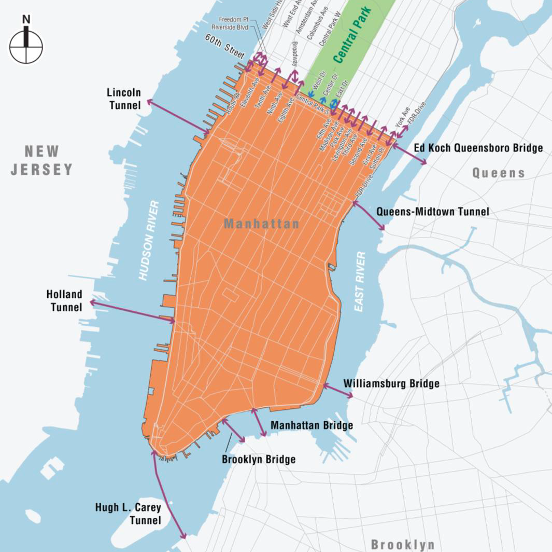Source: MTA
Last year, New York completed the environmental assessment of its proposed “Central Business District Tolling Program” and last month, the Federal Highway Administration determined that the program would have no significant impacts. That has kicked off a public comment period which will end on June 12.
The tolls have not yet been finalized, but they could range from $9 to $23 for cars during peak periods, and up to $82 for large trucks. (The MTA will determine the final toll structure after receiving recommendations from a Traffic Mobility Review Board.) The program is expected to have widespread benefits including reducing traffic, improving air quality, providing approximately $1 billion annually for transit improvements, and reducing vehicle travel time.
The program has its detractors, though, none more vocal than elected officials outside of New York. The state of New Jersey is located directly across the Hudson River from Manhattan and its elected officials are now working to derail the program. They are concerned because New Jersey drivers already pay at least $14.75 to cross the Hudson River during peak periods and New York has not yet announced how much more New Jersey drivers will have to pay.
New York City has been trying for more than 15 years to be the first American city to charge drivers enter its central business district. In 2007, New York’s mayor, Michael Bloomberg (with the backing of the George W. Bush USDOT), generated support for a congestion pricing program from business leaders, transit advocates, and environmentalists, but he was unable to convince the state legislature to support it.
Bloomberg was inspired by the program in London where motor vehicles entering the center of the city during peak periods pay a charge (it is now approximately $18.50). Other cities, including Stockholm, Singapore, and Milan now have their own congestion programs. (See Eno’s 2020 Congestion Pricing report for more information about key concepts, challenges, and emerging best practices).
In January of this year, Congressman Josh Gottheimer (D-NJ) introduced legislation that would prohibit the U.S. DOT from awarding any new capital investment grants to the MTA until drivers from all New Jersey crossings receive an exemption from any congestion charge. This month, the congressman announced that he would be introducing a bill requiring the U.S. DOT to conduct a full audit of the MTA.
U.S. Senator Robert Menendez (D-NJ) is also introducing legislation as well. And, New Jersey’s governor, Phil Murphy, has threatened to hold up actions of the bi-state Port Authority of New York and New Jersey if he considers the congestion pricing program is unfair to New Jersey residents.
The Eno Center for Transportation asked Rep. Jerry Nadler (D-NY) and Rep. Gottheimer (D-NJ) their thoughts on this contentious issue.
Nadler told Eno that with its wide range of transportation and environmental benefits, “Congestion pricing is the best way to get vehicles off our overly crowded roads, allowing us to reimagine our streets to create green space for parks, protected bike lanes, and dedicated bus lanes.” The toll revenue, he says is important, because it “will deliver resources needed to modernize MTA’s buses, subways, and commuter railroads.”
Nadler does not think that New Jersey would be affected differently than the rest of the region. The congressman, who lived in New Jersey until he was ten years old, expects “The hundreds of thousands of New Jerseyans who use the MTA everyday would appreciate that additional funding is being generated to repair New York City’s century old subway.” He understands that congressional members who oppose congestion pricing are doing everything they can to stop it from happening, but most of them he said, “want more funding for the MTA, not less.”
An impassioned Rep. Gottheimer told Eno that “the Congestion Tax is nothing more than a $23-a-day cash grab to fund the terribly mismanaged MTA, and it will increase pollution and traffic.”
He claims the congestion pricing fee will actually worsen transit for his constituents. Since fewer people will drive across the Hudson River during the peak period, tolls collected by the Port Authority of New York and New Jersey will decrease by approximately $125 million a year. Much of those revenues are used to support transit services between the two states.
Gottheimer said, “You will not find a stronger advocate [than me] for mass transit, but it’s clear that the MTA needs to immediately reverse course.” When we asked Gottheimer if he would feel differently if some of the congestion pricing fees were to be used for New Jersey commuters, he responded, “You don’t see Jersey asking New Yorkers to fix our problems. It’s time for the MTA to back down and find another solution to its financial woes that doesn’t squeeze more blood out of the Jersey stone.”
Click here for the full interview with Rep. Jerry Nadler
Click here for the full interview with Rep. Josh Gottheimer
Philip Plotch is Eno’s principal researcher and the author of the books “Politics Across the Hudson” and “Mobilizing the Metropolis.”




